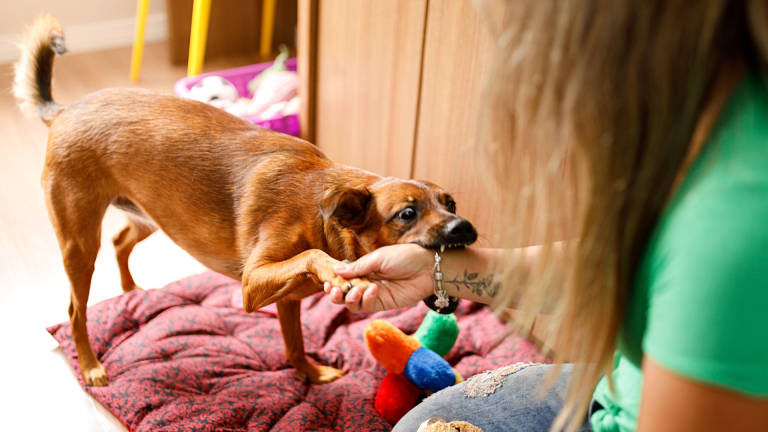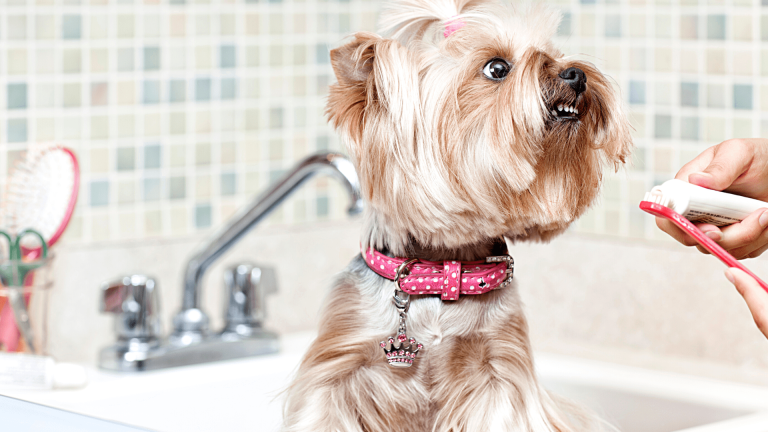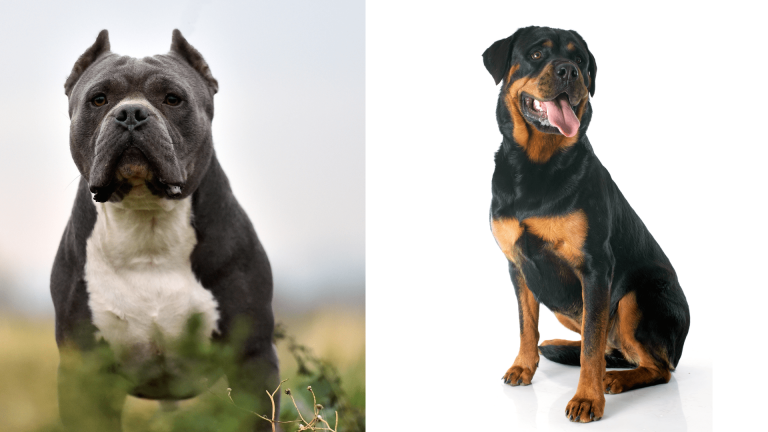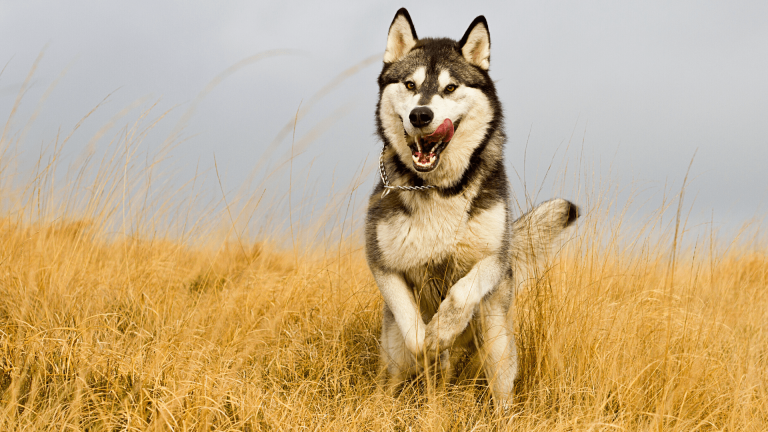What Age Does a Puppy Stop Biting? 14 FAQ

Owners of puppies should be aware that biting is a normal behavior. It is rare for a puppy to bite out of aggression . Instead, puppies often bite as they use their lips to explore their environment. All puppies go through a teething phase, during which they may show a breed-specific tendency to bite or carry objects in their mouths.
Your puppy develops their first set of teeth between 2-4 weeks.
These teeth, frequently called baby or milk teeth, are very sharp compared to an adult’s. Your puppy will undoubtedly have their baby teeth when you bring them home.
Your puppy will begin to lose its baby teeth when they are 3 to 4 months old.
And then the adult teeth start to erupt. Although pups frequently swallow their baby teeth, you might not notice this shift without looking inside their mouth. You may find their baby teeth.
When most dogs are six months old, the process of losing baby and adult teeth is finished. Any baby teeth still present might need to be extracted by a veterinarian.
The teething stage is a significant factor in why pups bite. They bite items to relieve the discomfort in their mouth.
As teething is a significant contributing factor in puppies biting, most owners notice a decrease in biting and nipping when their dog is about six months old.
Nevertheless, a puppy won’t necessarily stop biting because they aren’t teething. Most pups quit biting, but you’ll also need to educate them on using their mouths properly if you want them to stop.
Why Do Puppies Bite?

As noted, puppies frequently bite and gnaw to investigate their environment. They ask, “What is this?” whenever they bite into something. How will this affect me if I chew it? “How does it taste?”
A puppy can also ease the pain and discomfort of their gums and mouth while teething by chewing and biting—moreover, chewing releases endorphins, which lessen stress and elevate happiness.
When a puppy is overexcited, it may also bite. You might act like a wild child and run about the house grabbing and biting your hands, arms, and pant legs.
When Does Biting Start?
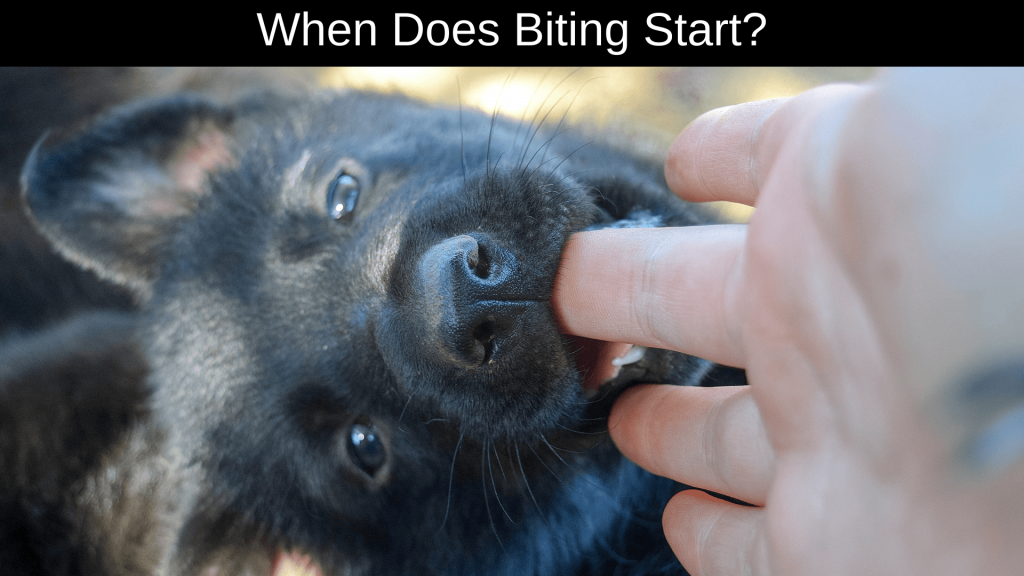
Puppy biting is a common behavior that starts when puppies are around 3 to 4 months old and begin teething. While their bites can be painful, it’s important to remember that it’s usually not aggressive or intended to harm. Puppies use biting as play and communication, a natural part of their development.
However, training your puppy to have good bite inhibition and stop biting before it becomes a problem is essential. This training should continue throughout their life, as puppies may continue to bite beyond seven months of age if not properly trained.
In this guide, we’ll learn how to stop a puppy from biting and reinforce positive behavior.
At what age do puppies calm down?

When do pups begin to relax? Most dogs start to calm down as they get older, typically about 12 months, while for larger breeds, it may happen more frequently between 18 months and two years.
Should you punish your dog for biting?
Punishing a dog for biting is not recommended as it may inadvertently reinforce the behavior and increase the dog’s stress levels. Instead, positive reinforcement techniques should be used to discourage biting and promote appropriate behavior.
When Do Puppy Stop Biting?

Around their first year, puppies typically stop biting. It presumes that your puppy’s daily requirements for engaging in play, physical activity, and constructive training are satisfied.
Your dog’s deciduous teeth, which are their sharp puppy teeth, will fall off as they age. Until the dog is roughly seven months old, replacing a puppy’s 28 puppy teeth with 42 permanent teeth takes place (longer for smaller breeds). Teething will now formally start for your dog. Due to possible sensitivity in their tongue and gums, they could have the urge to chew and gnaw. They may also have a tiny red stain on some of their toys. This usually occurs in puppies, prompting the biter to cease biting or to bite a different puppy when they play with their littermates and bite. If your puppy swallows its baby teeth, don’t be alarmed; puppies always do this. When speaking of
Your puppy will transition into adolescence (sometimes known as the “teenage” phase”) once the last of its adult teeth finish coming in. Make sure to continue taking care of their everyday demands and attempt to come up with inventive and enjoyable ways to amuse them because they might become a little rowdier in other ways.
If a puppy bites you out of anger or over a particular item, it could go on to have more complex behavioral issues. It would help if you spoke with a competent expert in positive dog behavior to understand better what is familiar and how to meet your dogs needs best.
Do puppies grow out of biting?

Age is a critical element in preventing puppy biting in most dogs. When does a puppy quit biting? It is a complex topic with no easy solution. Age plays a role, but many other factors exist at work.
When puppies are six months old, they usually stop biting since their teething is over. When they reach the age of six months, puppies who have been handled well and taught healthy habits may have entirely stopped biting.
Expecting a Malinois to stop biting is impractical because the Belgian Malinois breed excels at “bite sports.” There is a post about biting Border Collies here. Border Collies are a breed that can bite. Yet, once teething is over, many other breeds no longer feel the need to bite and nip excessively.
Some people conclude that pups grow out of biting because of this, along with a general maturity and training in appropriate behavior when using their teeth. Although maturity and age matter, you must frequently train your dog to stop biting.
Should a seven-month-old puppy still be biting?

Be warned that even if you do everything correctly, this habit can only stop once your baby is 5 to 6 months old. Keep in mind that puppies go through natural developing stages. This blog will provide additional advice and recommendations for puppies who are particularly biting or those who begin biting after 5 to 6 months.
How Old must My Puppy Stop Biting?
Puppy teething causes them to bite, but they also bite while playing. And biting starts when the puppy has gotten used to their new home, which is around nine weeks old. With a few rare exceptions, puppy biting will end when your dog is seven months old and has his entire adult teeth.
At What Age Should a Puppy Stop Biting?

Puppy biting is a common issue that many dog owners face. Puppies use their mouths to explore the world and play, but this behavior can quickly turn into an annoyance or even a danger if not addressed. The good news is that most puppies will naturally outgrow their biting habit by the age of three to five months. This is due to a combination of factors, including teething completion and the puppy’s natural development of social skills and bite inhibition. However, some puppies may continue to bite or mouth beyond this age, and it’s essential to address this behavior with proper training and socialization. Consistent and positive reinforcement training can help teach puppies appropriate behavior and reduce the risk of biting as they grow into adult dogs.
How Long Does the Puppy Biting Stage Last?
Puppies learn courteous, soft mouthing—and that human skin is highly delicate—through bite-inhibition training. I should clarify that nipping and chewing are indicators of a developmental stage that may last 6 to 9 months from birth before discussing methods and approaches for dealing with puppy nipping.
Is It Normal for a 12-Week Old Puppy to Bite?

Yes, it is entirely normal for a 12-week old puppy to bite. Puppy biting is a natural part of their development and exploration process. Puppies, like human babies, explore their environment using their mouths, and they also learn about bite pressure and inhibition through their interactions with their littermates and their mother. When a puppy is separated from its mother and littermates, it will continue to use its mouth to explore the world, and this can result in biting behavior. However, it is essential to teach your puppy bite inhibition from an early age to ensure that they learn to control their biting behavior as they grow into adult dogs. With consistent training and socialization, your puppy will learn to inhibit their bites and develop a soft mouth as an adult dog.
Is It Normal for a Three Month Old Puppy to Bite a Lot?
The good news is that your puppy’s desire to nip and chew on anything they see is quite natural; the bad news is that their razor-sharp puppy teeth may hurt! You don’t want the nipping of your puppy to become a lifelong habit.
At What Age do Puppies Settle Down?

Most puppies often begin to settle between 6 and 12 months of age, but as was already noted, a few more elements might affect a puppy’s energy levels. Some could counter that because female dogs mature more quickly than male dogs, they are more composed. However, their breed is a more important consideration.
A Puppy Eventually Stops Biting ?

We discussed the expected time frame for your dog to stop biting in this article. Fortunately, at about seven months, you’ll notice that your puppy has lost interest in nipping at anything.
We discussed the reasons behind your puppy’s penchant for biting as well as gentle methods of training. Hopefully, you have all the knowledge to teach your puppy to quit biting forcefully and engage in non-toothy play.
Bottom-up
So, I hope you got the full idea on What Age Does a Puppy Stop Biting? 14 FAQ.
Please comment below about your ideas and share this “ What Age Does a Puppy Stop Biting? 14 FAQ ” article with your friends.
Keep yourself updated by regularly visiting our website for more exciting content. And don’t miss out on our previous articles as well.
Until You Can Read: How Many Teeth Do Dogs Have? 4 Types Of Teeth.
You Can Read : Most Dangerous Animals in the World

